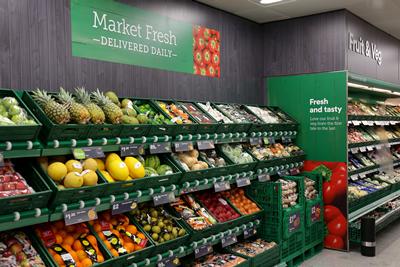New study will test if a healthier supermarket layout improves diet

The impact of product placement in supermarkets on the diets of families will be investigated by researchers at the University of Southampton.
The impact of product placement in supermarkets on the diets of families will be investigated by researchers at the University of Southampton.
Working with retailers Iceland Foods Ltd, and funded by an award of nearly £630,000 over the next three years by the National Institute for Health Research (NIHR), Dr Christina Vogel, Senior Research Fellow in Public Health Nutrition will lead the WRAPPED study to help determine whether creating a healthier layout in supermarkets can improve food purchasing patterns and the diets of women and children.
The study is the largest supermarket trial internationally to look at the placement of healthy products in stores. It will test whether increasing the range of fresh fruit and vegetables and placing them at the front of the store helps customers to eat better.
The study will invite 1,620 women aged 18-45 years who regularly shop at one of 36 Iceland stores located across England to take part. They will either shop at stores where the layout will change or stores where it will remain the same. The researchers will look for differences in food purchasing and eating patterns between the women shopping at stores with the healthier layout and those using the unchanged stores.
“With the publication of the government’s childhood obesity plan in June, the race is on to find innovative ways to curb childhood obesity and hit the government’s ambitious goal to halve childhood obesity by 2030,” said Dr Vogel from the MRC Lifecourse Epidemiology Unit at the University of Southampton.
“We’ll be focusing our research on women as they do most of the food shopping and because mothers’ diets are closely linked to their children’s food habits; also national statistics show that 50 per cent of women aged 25 to 34 years in England are overweight or obese,” she continued. Dr Vogel and her team will survey women participating once before the stores change, and three times afterwards to find out about the food they and their young children (aged two to six years) usually eat, and their views on the supermarket environment. Women will also be asked to share the food purchasing information from their loyalty cards for the period of the study.
“We’re encouraged by the changes Iceland Foods are making as our earlier work showed that there is a tendency in smaller and discount stores for fruit, vegetables and other healthy products to be placed in less prominent positions and for the range to be limited.” Janis Baird, Professor of Public Health and Epidemiology and joint leader of the project, added “We are delighted to receive funding from the NIHR Public Health Research programme and very pleased to have Iceland Foods as our collaborators. They have not provided any financial assistance to the research team but will provide in-kind support by implementing the intervention and sharing [anonymous] electronic sales data with us in accordance with data protection regulations to enable us to complete the full evaluation.”
Matt Downes, Head of Format Development at Iceland said: “We were keen to support the NIHR and the University of Southampton in their study to evaluate the impact of product placement in supermarkets on the diets of families. We know that childhood obesity is a growing issue and the retail industry has its part to play in tackling this. The outcomes of the study will provide insights for the wider retail industry around the impact of store merchandising on purchasing decisions, and in turn the diets of our customers.”
Professor Martin White, Director of the NIHR's Public Health Research programme, said: "This research will help us to understand how people's shopping behaviour can be influenced by product placement in supermarkets. This is particularly timely given the Government's current consultation on the regulation of location-based promotions in food retailing, which forms a part of the Childhood Obesity Plan. There is already some evidence that such strategies may change consumer purchasing patterns, but more and stronger studies are needed. The small changes in purchasing encouraged by product placement can all add up to contribute to a healthier shopping basket and healthier eating at a population level. And the multiple strategies in the Childhood Obesity Plan will together all help to create healthier food environments for everyone.”